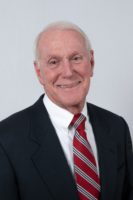
The youngest patient Dr. Eric Spooner ever treated was in utero. The oldest, when Dr. Spooner retired in 2016, was 71.
“If you are able to diagnose a problem within a child’s heart and have a surgeon fix it, you can take a child who would be born, and would normally only live a day or two, and give them possibly 75 years of life. Now, that makes it really worthwhile,” Dr. Spooner said of his 40-year career working with children born with congenital heart defects.
On Saturday, Feb. 29, at the Capital Region Heart Ball at the Hall of Springs in Saratoga Springs, Dr. Eric Spooner, retired pediatric cardiologist, will receive the Donald Led Duke Heart Hero Award for his work with some 20,000 children.
Some of those children will be at the Heart Ball to present Dr. Spooner with his award. One in 100 children is born with a congenital heart defect. For Dr. Spooner, one of those will be 8-year-old Aedan, who had three open-heart surgeries by the time he was 2, or 12-year-old Eliana, who was born with four congenital heart defects.
“He was so genuine with us, and so peaceful and calm, that when he was sharing the diagnosis, he made me feel at ease,” said Leah Clem, Eliana’s mother, of the first time she met Dr. Spooner, when she was six months pregnant with Eliana. Eliana and her parents will be at the Heart Ball to help honor Dr. Spooner.
“You really form a strong, emotional bond with the families,” Dr. Spooner said. “The vast majority of children I see are under the age of 5. The most rewarding part is when a child has a heart defect that you initially think can’t be repaired, but then we are able to find a way to fix it.”
When Dr. Spooner finished his training at the University of Michigan, echocardiography was still a new science. He helped develop this area at U of M when it was in its infancy, and brought it to Albany Med in 1977.
“I then started doing fetal echocardiograms in 1983,” Dr. Spooner said. “Before that, obstetric ultrasound hadn’t been developed enough to detect much more than gross abnormalities which might prompt referral. Or perhaps the obstetrician had noticed an unusual heart rhythm or a or other problem.”
But with advances in fetal echo, it became possible to accurately diagnose cardiac defects early in pregnancy, which allowed his team to plan for surgery or other treatment immediately after birth, rather than when the baby had become critically ill.
Putting pieces together like a puzzle has been rewarding for Dr. Spooner, as has working with children.
“It’s like a detective mystery,” he said. “You are presented with a clue here and there, and you piece together a diagnosis. I always found children wonderful to deal with. They’re resilient and fun to be with.”
Dr. Spooner was often part of the surgeries that his patients had.
“It’s very emotional for families when a child is in the operating room,” Dr. Spooner said. “Their child is in surgery and the heart is stopped. When I was done with the echo in the OR, I would go and sit with them and tell them what we had found and what we would do about it.”
“The Capital Region is fortunate to have the great cardiac care that it does,” said Jennifer Corcoran Conway, partner at Tully Rinckey, board member of the American Heart Association in the Capital Region, and parent lead of the Cardiac Kids group in the Capital Region. “Tim and I first met Dr. Spooner when we learned that our son Aedan would be born with a congenital heart defect. I was 20 weeks pregnant. Dr. Spooner’s care for Aedan over the years has been nothing short of remarkable. He cares about these kids like they’re his own – sharing our frustrations, tears and triumphs. He took two terrified first-time parents and reassured us that, not only would they do everything they could to ensure his survival, but to help him thrive. Even after his retirement he continues to follow his patients – celebrating each new milestone with us. We have been able to care so well for Aedan because Dr. Spooner cared for us as parents, and Aedan, so well.”
Dr. Spooner is honored to receive the Donald Led Duke Heart Hero Award.
“The Heart Association has been around far longer than I’ve been in cardiology,” Dr. Spooner said. “They’ve been instrumental in promoting heart health, and a lot of the decrease in cardiac mortality has been due in part to the AHA. I’m pleased that people think I’m worthy of this award. There are people more deserving of it, but I am grateful to receive it.”
Dr. Spooner and his wife live in Delmar, and have two grown daughters, who are both teachers. The Spooners have four grandchildren.
It’s been almost four years since Dr. Spooner retired on April Fool’s Day in 2016.
“I had a great career, but I still miss my patients,” Dr. Spooner said.
For information about the Heart BAll, visit CapitalRegionNYHeartBall.heart.org or contact Sharon.Horton@heart.org, 518.626.8754.